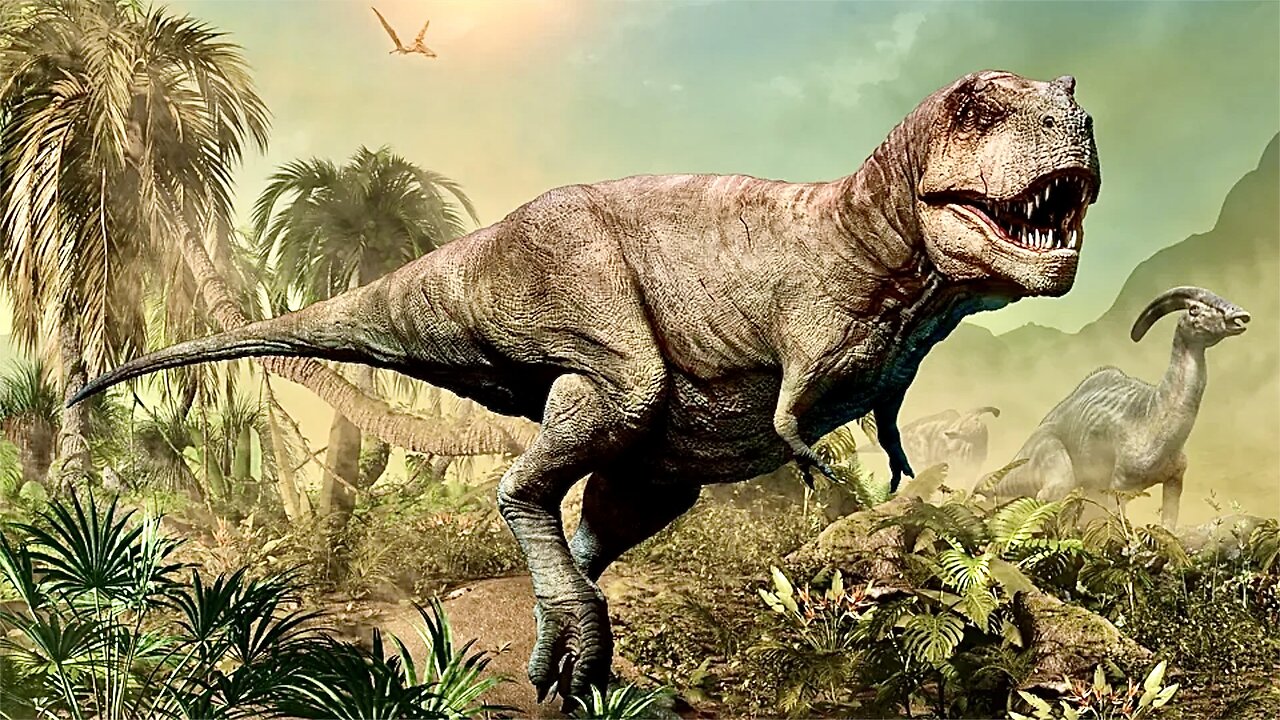Premium Only Content

Tyrannosaurus Rex - New Discoveries On Dinosaur Life - Full Documentary
Paleontologist Jack Horner questions the assumption that Tyrannosaurus Rex was a predator. He thinks there is a reasonable chance it was a scavenger that had little ability to hunt or even run. He's out in the field looking for evidence to try to settle the debate. Horner with his digging team, travel to Hell Creek Formation in search for dinosaur fossils, while also following Horner as he presents his view of the theropod dinosaur Tyrannosaurus rex as a scavenger rather than a predator, as it is often portrayed in popular culture.
Why a New T. Rex Study Is Riling Up the Paleontology World - Established scientists are casting serious doubts on new research suggesting that the infamous, ferocious dinosaur is actually three different species. The Tyrannosaurus rex is perhaps the most famous and recognizable dinosaur, fascinating scientists and the public alike. With its enormous body and small arms, the “King of the Tyrant Lizards” was one of the largest land-dwelling predators.
Now, in a controversial new study published in Evolutionary Biology, researchers are proposing that the T. rex was actually three different species: T. rex, T. regina and T. imperator.
“This paper is likely to rock the paleo community, and the public that is so used to good old T. rex,” Gregory Paul, an independent paleontologist, paleoartist and author on the study, tells the New York Times’ Asher Elbein.
The researchers examined 37 specimens, looking at variations in femur sizes and dentistry, as well as the layers in which the dinosaurs were found. They posit that specimens found in lower layers are the species T. imperator, stocky-boned specimens are the T. rex, while the smaller boned specimens are a species called T. regina, or “tyrant lizard queen,” writes the Guardian’s Nicola Davis.
But some paleontologists who have been in the field for years aren’t convinced by the new paper.
“It’s just shades of gray and shapes in clouds — there’s no validity here at all,” Thomas Carr, a paleontologist at Carthage College in Kenosha, Wisconsin, tells National Geographic’s Michael Greshko.
Carr previously studied variations in 1,850 different features in T. rex specimens and found no evidence that the species should be split up. He tells Popular Science’s Shi En Kim that the new research shows only subtle differences that could be attributed to variations among individuals.
“The features that identify species are utterly unique, smack-in-the-face-with-a-frying-pan obvious,” he tells the publication. Moreover, the authors were unable to assign a species to several of the skulls, despite them being in excellent condition, he says.
Another paleontologist, Steve Brusatte from the University of Edinburgh, tells the Guardian that he too disagrees with the paper’s findings.
“I understand the temptation to divide T. rex into different species, because there is some variation in the fossil bones that we have,” he says to the Guardian. “But ultimately, to me, this variation is very minor and not indicative of meaningful biological separation of distinct species that can be defined based on clear, explicit, consistent differences.”
Part of this debate stems from the fact that scientists don’t universally agree upon what counts as a species, per the Times, and dinosaur taxonomy is subjective. Currently, the T. rex is the only species in the genus Tyrannosaurus, but the study’s authors say this is only because of a lack of research on enough specimens.
“For over a century, the species T. rex potentially being a de facto taxonomic waste basket was to a fair extent a consequence of available sample size, the number of reasonably complete Tyrannosaurus skeletons being much too small to sufficiently examine the issue,” the authors write. “However, that situation of taxonomic stagnation due to specimen deprivation has dramatically improved since the late 1900s. An in-depth examination is now possible.”
Paul tells Reuters’ Will Dunham that he knows the study will spark controversy, and the dino’s iconic status will only amplify the debate.
“I’m aware that there could be a lot of people who aren’t going to be happy about this,” he tells the Times. “And my response to them is: Publish a refutation.”
#history #evolution #dinosaur
-
 2:48
2:48
Steven Crowder
1 day agoCROWDER CLASSICS: What’s This? | Nightmare Before Kwanzaa (Nightmare Before Christmas Parody)
279K12 -
 33:49
33:49
Quite Frankly
22 hours agoThe Christmas Eve Midnight Telethon
94.4K21 -
 2:12:46
2:12:46
Price of Reason
21 hours agoAmber Heard BACKS Blake Lively Lawsuit Against Justin Baldoni! Is Disney CEO Bob Iger in TROUBLE?
51.7K22 -
 1:01:17
1:01:17
The StoneZONE with Roger Stone
16 hours agoChristmas Edition: Why the Panama Canal is Part of the America First Agenda | The StoneZONE
122K46 -
 18:12:15
18:12:15
LFA TV
1 day agoLFA TV CHRISTMAS EVE REPLAY
138K17 -
 13:32
13:32
Scammer Payback
17 hours agoChanging the Scammer's Desktop Background to his Location
9.47K3 -
 4:21
4:21
BIG NEM
19 hours agoNikola Tesla's Secret to Cultivating Creativity & Genius
6.52K1 -
 15:03
15:03
The Anthony Rogers Show
1 day agoAnthony Rogers - Live at Cusumano's Pizza (Upstairs)
5.16K1 -
 4:33:48
4:33:48
tacetmort3m
1 day ago🔴 LIVE - THE ZONE KEEPS PULLING ME BACK - STALKER 2 - PART 15
71.8K12 -
 22:45
22:45
Brewzle
23 hours agoI Went Drinking In A Real Bourbon Castle
52.1K4